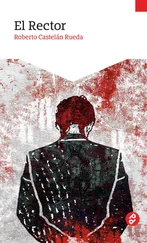The nurse switched on the reading lamp. Mandy explained that she couldn’t stand the pain. Dr. Bialystotski said, “That shouldn’t be happening, let’s examine you,” and closed the curtains round her bed even though it was a private room.
ON ONE SIDE of the bed stood the nurse, on the other the doctor, and both of them together lifted the blanket with the sheet beneath it, and exposed the bandaged back. Then together they removed the bandages, and the young doctor very carefully, but nevertheless painfully, removed the sterile strips supporting the implants, touched here and there, and accompanied the touches with questions:
“Does it hurt here? Does it hurt here? Does it hurt here? And here?”
Mandy answered yes to every touch.
He asked, “Mrs. Gruber, are you sensitive to antibiotics?”
“No,” she groaned.
“How much do you weigh?”
“Fifty-five kilo,” she replied weakly.
He spoke to the nurse in terms of drugs and ccs. And there was a note of urgency in his words.
“And what about the morphine?” asked Mandy.
“Give her morphine,” he instructed the nurse, with a severe expression on his face, “and first come with me to the office.”
But he didn’t wait until they reached the office. Mandy heard him raising his voice in the corridor.
“I don’t like it. We have to locate that butcher from Dresden, Yagoda, immediately, and bring him back urgently. This surgery is his responsibility.”
“But it’s night now in Dresden too,” said the nurse.
“I don’t give a damn,” he yelled, and sounded as if he had given himself a fright.
“Aah,” he cried suddenly, “she has to be given a pulse of steroids immediately, and make an appointment for a bone-marrow test on Medical On Line for today! And don’t forget Dr. Yagoda,” his voice receded, as if he was talking to her while walking backward, “Keep at it until he answers the phone. Night time in Germany. .” he snorted in contempt.
Mandy lay with her eyes closed, beside herself with suspense. The nurse came in and added something to the infusion.
“Is my condition grave?” asked Mandy.
“Grave? I wouldn’t say so. Your condition is worrying, and it’s being taken care of. Don’t worry, the painkiller will help you in a minute. Think positive thoughts and good things will happen.”
“Who can think at all?” asked Mandy, and the nurse didn’t answer her.
IT WAS NOT ONLY avoiding thoughts of home that helped the good sniper to carry out his mission as he lay on the roof of a building in Tulkarem. It was not only the disconnection from his mother, that not thinking about her constituted a kind of rest for him. Sniper number two, Hai-Ad Gonen, had given him a bit of cocaine earlier, and Dael could already feel its blessed effects.
Dael Gruber, who all the guys in the army and in civilian life called Gruber due to the difficulty in pronouncing the two vowels one after the other, was regarded by his friends as a sensitive sniper with a delicate soul. And indeed, he was an example to contradict what people generally say about snipers in armies, that they detach themselves from feelings and simply say to themselves, “Someone has to do the job,” and execute their task with cold-blooded composure. This was a sweeping generalization, and it didn’t apply to Dael.
Dael went for it in a big way, in other words he shot to kill, otherwise it wouldn’t have worked for him. It’s a question of psychological makeup. Sometimes it was a little hard for him to shoot at a concrete target, but then he concentrated and took targets from his life instead and set them up in his imagination in the place of the wanted man. In many cases he imagined the father of Moran Eliot, his girlfriend when he was at the end of the eleventh grade, when she was at the end of the twelfth grade.
Moran Eliot was his first love. It lasted for June — July — August and half of September. Moran was his first, but he wasn’t her first, and she said that after the first it didn’t matter anymore what number he was. It ended badly between them, and with hindsight he didn’t care. Her father was in his sights because he threw Dael out of the house in the most humiliating way, after Moran didn’t want to see him and called him a stalker.
With Aya Ben-Yaish things were steadier, if with less fire. She was a spoiled kid who had moved to Tel Baruch North with her parents when her father had been obliged to sell their villa after going bankrupt, and rent an apartment in Telba-N.
They met for the first time in Mikado. She went down there in very short white pants, as dictated by fashion, to buy Winston Lights for her father, and Dael went to buy Winston Lights for himself. He smoked, of course. No great love erupted between them, but there was definitely a certain love, more meaningful than a convenient arrangement. However, it was true that the distance between Stefan Zweig Street, where the Ben-Yaish family lived, and Yocheved Bat-Miriam Street, where the Gruber family lived, was conveniently short, and Aya herself was pleasant and compliant on the whole.
IT WAS A RESERVIST psychologist in civvies who taught the snipers imaging. He arrived in the framework of a training course organized by the army for elite soldiers, and tried, for example, to explain what happened in the brain of the sniper at the time of shooting. He also gave advice on what to do in all kinds of specific stress situations within a general situation of stress. He divided their time according to levels of stress: very, very stressed, very stressed, and so on, down to apathetic. Dael and three other guys were the only ones who wrote down what he said, and so he spoke only to them, but mainly to Dael.
Dael also asked good questions, and the reservist was happy to answer them, and before answering each question he said, “I’m happy to answer your question.”
He worked with them on controlling their emotions from the moment they left the base until they reached the site of the assignment. And then during the assignment until the minute they left the field. Dael wrote down all the tips, and looked at his bored companions and wondered what was going on in their heads. He imagined that what was going on it their heads was what would be going on in his head if he hadn’t been so stressed by nature and had not lived in a house where stress was what connected the inhabitants.
The reservist gave them exercises for the suppression of irrational thoughts, and flavored his words with amazing stories about his own past as a senior sniper, before he became a psychologist, and Dael thought he was definitely okay, this guy, like his mother said about the friends he brought home. On principle, he told them to aim in their imagination at people they didn’t feel anything in particular for, neither hate nor love. What he most recommended was a faint revulsion, and he confessed that he hit his own bulls eyes best when he imagined targets that aroused a faint revulsion in him, like teachers in high school, or even commanding officers in the army.
Dael thought that he could try, for example, the guests at his bar mitzvah. Not the ones that came to the synagogue, but the ones that turned up in droves after the service to lunch at the Stefan Baron restaurant.
But when none of the imaging exercises worked, and destructive thoughts swarmed into his mind like locusts, he thought about his father.
His hatred for his father was classic. His adoration of his mother was classic too. And his attitude toward his sister vacillated according to his mother’s attitude toward her. In the days of Lirit’s forbidden love for Lucas, sixteen-year-old Dael was the chief instigator of the family hostility toward the wayward girl, and on one particularly cold Saturday, when nobody wanted to leave their previous family home in Tagore Street, he wrote on the door of her room “Lirit the Parakeet,” a nickname that had the power to insult her when she was a child, and to which she was still, at the age of almost twenty, not immune.
Читать дальше












